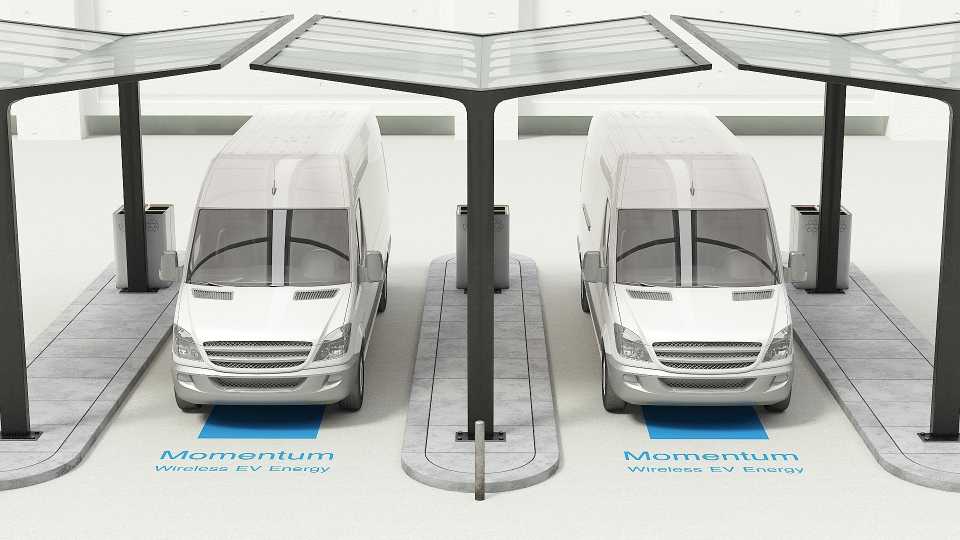A project has been given £1.6m funding to explore how wireless charging at shared logistics hubs can reduce the cost of decarbonising last mile transport. It will be led by Heriot-Watt University, City of Edinburgh Council and Flexible Power Systems (FPS).
Wireless charging is a technology that allows electric vehicles (EVs) to recharge while parked on charging pads instead of using cables that need to be manually plugged in by a driver.
The UK’s first wireless charging hub for light commercial vehicles will be installed at Heriot Watt University’s Edinburgh campus in early 2021 to service specially adapted vans from both City of Edinburgh Council and Heriot-Watt’s estates team. The technology has already been proven for mass transit applications and will be supplied by specialist firm, Momentum Dynamics.
The project will also test how shared infrastructure and fulfilment equipment at urban hubs at large scale can enhance vehicle and staff productivity. This involves developing a large-scale simulation of the behaviour of charging hub users using real world data to understand the impacts on their business.
If the project is successful, both the infrastructure and the technology behind it could be adopted by fleets across the UK.
A team at Heriot-Watt University is working with data science and simulation specialists from FPS to study how centrally located hubs could be developed in locations that minimise stem mileage for all participating operators. The hubs would be equipped with fast chargers that can charge vehicles in a relatively short visit (30-60 minutes). The hubs would be owned by a third party and many users would be able to schedule access day ahead (e.g. retailer, parcel delivery, utility, council, and small-scale transport fleets). Company transport planning systems would negotiate access to the hubs to ensure everyone’s charging session fitted with an optimal route.
The project is funded by the Office for Low-Emission Vehicles and delivered through Innovate UK.
High-power wireless EV charging combined with shared infrastructure concept is expected to have considerable benefits and cost-savings for the logistics industry. These include faster starts to charging sessions with no downtime for plugging in to improve vehicle utilisation and create bigger benefits from opportunity charging; no cables to cause trip hazards or require maintenance; and future proofing for the advent of autonomous vehicles (which will not have a driver to plug them in).
FPS’ Managing Director Michael Ayres explains: “Productivity drivers and longer journeys mean commercial vehicles may need to charge away from the depot or at high speeds during the day. Rapid and ultra-rapid chargers required for a fast turnaround currently make up less than 25% of publicly available chargers and can be difficult to access if they are in use or out of service.
“High-power rapid chargers can be expensive both in terms of the chargers themselves and the electricity network infrastructure required to support them. Splitting the cost of chargers and the connection through a shared charging hub can mitigate a portion of these costs. The project is testing the sharing of charging hubs between logistics, retailer, local government, and university owned commercial vehicles.”
“These charging hubs require high use to be economically viable. The project uses powerful wireless charging to shorten the time vehicles need to be in the charging hubs. At the same time, we are investigating adding basic fulfilment capabilities to improve the productivity of logistics vehicles visiting the hubs.”
Professor Phil Greening, a co-director of the Centre for Sustainable Road Freight, based at Heriot-Watt University continued: “While highly utilised shared infrastructure and collaboration have great potential to reduce the costs of decarbonising last-mile travel, there are complex scheduling and commercial trade-offs to be considered.”
“The modelling tools and approaches developed in our Engineering and Physical Sciences Research Council (EPSRC) funded research at the Centre, combined with the collaboration we’ve undertaken with FPS over the last two years, will both be key to untangling these challenges and making sure this potential is realised.”
The charging hub concept has the potential to contribute to decarbonising commercial vehicles in the City of Edinburgh.
City of Edinburgh Council’s Transport and Environment Convener Councillor Lesley Macinnes said:
“We’re delighted to be working with Heriot-Watt University on this innovative project by facilitating the use of electric vehicles across our fleet. We are committed to supporting the use of sustainable, low emission travel and continue to replace vehicles with cleaner models wherever possible.
“Our own Electric Vehicle Action Plan will result in a significant increase in charging points across the city which, alongside projects such as this, will help encourage the take-up of electric vehicles as a low carbon, environmentally-friendly transport choice.”
Scott Millar, Fleet and Workshops Manager for The City of Edinburgh Council, said:
“We are already deploying electric vehicles across our fleet and looking at ways we can drive adoption in the wider community. Providing charging infrastructure like shared hubs has the potential to play a key part of removing barriers to uptake for both the council and the community. We’re excited to take a leadership role here as a successful project in Edinburgh could present a model for other councils to use to reduce transport emissions in cities.”
Source: https://greenfleet.net
CUT COTS OF THE FLEET WITH OUR AUDIT PROGRAM
The audit is a key tool to know the overall status and provide the analysis, the assessment, the advice, the suggestions and the actions to take in order to cut costs and increase the efficiency and efficacy of the fleet. We propose the following fleet management audit.




